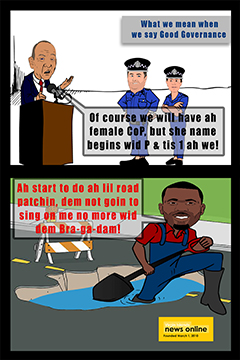The loving versus the material parent
This community servant frequently gets the urge to write, especially when perusing a local newspaper, searching for the news highlights on an online global media, or from simply reading a great story, wherever that narrative may happen to lie. Sometimes a sheer observation, casual conversation or direct experience, will get this deep need to tell a story going. He gets restless, his fingers itch.
Yes, he will use whatever source appropriate, especially when he discovers something worthwhile, even beneficial and valuable to his readership. And quite often he hears the lofty call to write on the implications of poor parenting on the wider Virgin Islands community. This may simply begin with a nudge from deep within, that the time is ripe for such a socially oriented type narrative.
But usually it is the result of observation, of concrete evidence of the deterioration in society and community that results from the absence of one parent or the other from the home, or the neglect of children by adults who appear more concerned about their careers and material well being, than a kid who is running around in a gang, or breaking into the homes of his neighbors. Family is the bedrock of strong society in every parameter imaginable. Its form and health affects the social, economic, and political welfare of the wider society, and its deterioration spells the equal decline of community.
Poor parenting is a huge problem in the Virgin Islands as most residents will agree. It is the source of all social evils especially with regard to our children, youth, and young adults. Every issue in this community related to crime and antisocial behavior comes down to the parent and child relationship. And by parent, this Pilgrim is not necessarily speaking about the biological, the sperm donor, the womb that brings forth; but those who have the primary input in a child’s life: biological parents, grandparents, guardians, foster parents, the wider village, and so on.
Incidentally, Sandra Phillip Hodge, Director of Related by humanity, in an article in BVI News of July 10, 2012, wrote of her amazement ‘’ at how advanced technology and economic development have become the scapegoat for parental mismanagement. Parents needed to understand that that if they did not have their priorities straight children would not have their priorities straight either.’’
Ms. Hodge stated that ‘’ the first rule of parenting was not to expect others to do for you what you should be doing for yourself. Raising children the right way should be the number one priority. Over compensating with the latest gadgets and games should be considered a sin.’’ The essence of her article was an exhortation and call to better parenting, a very important admonition if this small country is to have a stronger, cohesive, and more wholesome society.
Then Maureen Dowd, a North American columnist, writing on a similar issue in Virgin Islands Daily News, a United States Virgin Islands Newspaper, on January 5, 2012, an article titled ‘’ Oedipus Complex’’ gave a rendition of the importance of the father figure in society. She was very poetic in her exertions. She described the United States as a place filled with ‘’ sons struggling to live up to fathers; sons striving to outdo fathers; sons scheming to avenge fathers; sons burning to one-up fathers; sons yearning to impress fathers who vanished early; sons leaning on fathers; and sons using fathers as reverse playbooks.’’
This was a story of dad as critical influence in the life of the son. But please bear in mind that father is also critical in the life of the daughter. The missing father figure in Virgin Islands society is the main source of dysfunction in the family and wider community. And this dysfunction leads to most of the ills we experience in this small country, from poor discipline and performance in schools, to a prison filled with young male adults; even sexual promiscuity in our daughters. The days when the village community came together to parent the child are gone: a sad disappearance of a precious communal paradigm.
In another related article on the issue of parenting, in the same USVI Newspaper, but this time of January 9, 2012, by one Nicholas Kristof, a contributing columnist from the New York Times, titled ‘’ a poverty solution starts with a hug,’’ Mr. Kristof wrote a lengthy ‘thesis,’ and began with the assertion that ‘’perhaps the most widespread peril children faced was not guns, swimming pools, or speeding cars. Rather, scientists are suggesting that it may be ‘toxic stress’ early in life or even before birth.’’ The critical years for forming character were between the ages of one and five. This most child experts agreed with.
Kristof wrote that ‘’ toxic stress might arise from parental abuse of alcohol or drugs. It could occur in a home where children were threatened and beaten. It might derive from chronic neglect. For example, a child cries without being cuddled. Affection seemed to defuse toxic stress, so keep those hugs and lullabies coming. There was the suggestion that stress emerged when a child sensed persistent threats but no protector.’’ A loving and secure environment in early childhood was the best predictor of strong social and cognitive ability later on in life.
The article revealed how according to the American Academy of Pediatrics, ‘’cues of a hostile or indifferent environment flooded an infant, or even a foetus with stress hormones like coritsol in ways that could disrupt the body’s metabolism or the architecture of the brain. ‘’ Children born and raised in stressful environments were sometimes permanently undermined. Even many years later as adults, they were more likely to suffer heart disease, obesity, diabetes, and other physical ailments. They were also more likely to struggle in school, have short tempers, and tangle with the law.
The crucial period seemed to be from conception through early childhood. After that the brain was less pliable and had trouble being remolded.’’ According to Kristof, Jack P Shonkoff, a Harvard Pediatrician, and a leader in his field, had determined that ‘’ kids who experienced adversity had trouble learning.’’
Now, poverty is certainly not synonymous with homes where kids are neglected and lack good parental role models, but poor homes tend to be over represented in this area. And Kristof described how research showed that ‘’ poverty was difficult to overcome, and even though many children from poor homes shined academically, others skipped school, abused narcotics, broke the law, and had trouble settling down in a marriage and a job. Then their children would replicate the pattern; early experiences were literally built into their bodies.’’
Where the article clearly informed was at the point where Shonkoff, and research by the American Pediatrics Academy determined that ‘’ the most cost effective window to bring about change was not high school, or even kindergarten, but in the early years of life, or even before birth. Protecting young children from adversity was a promising science based strategy addressing many of the most persistent problems facing contemporary society, including limited educational achievement, diminished economic productivity, criminality, and disparities in health.
Shonkoff used the analogy of scholars who ‘’examined children who had been badly neglected in Romanian orphanages. Those who spent more time in orphanages showed symptoms of stress with significant negative brain change.’’ This proved that if a society wanted to ‘’chip away at poverty and improve educational and health outcomes it had to start earlier. For many children, damage had been suffered from before the first day at school. Kristoff quoted Frederick Douglass who noted that ‘’ it was easier to build strong children than to repair broken men.’’ One of the best things a parent or the wider community can do to build strong society is simply provide a loving and safe environment for infants and young children, then after that things will take care of themselves.
Dickson Igwe is on Twitter and Facebook



.png)

_(3).png)













_(3).png)



















.png)




2 Responses to “The loving versus the material parent ”